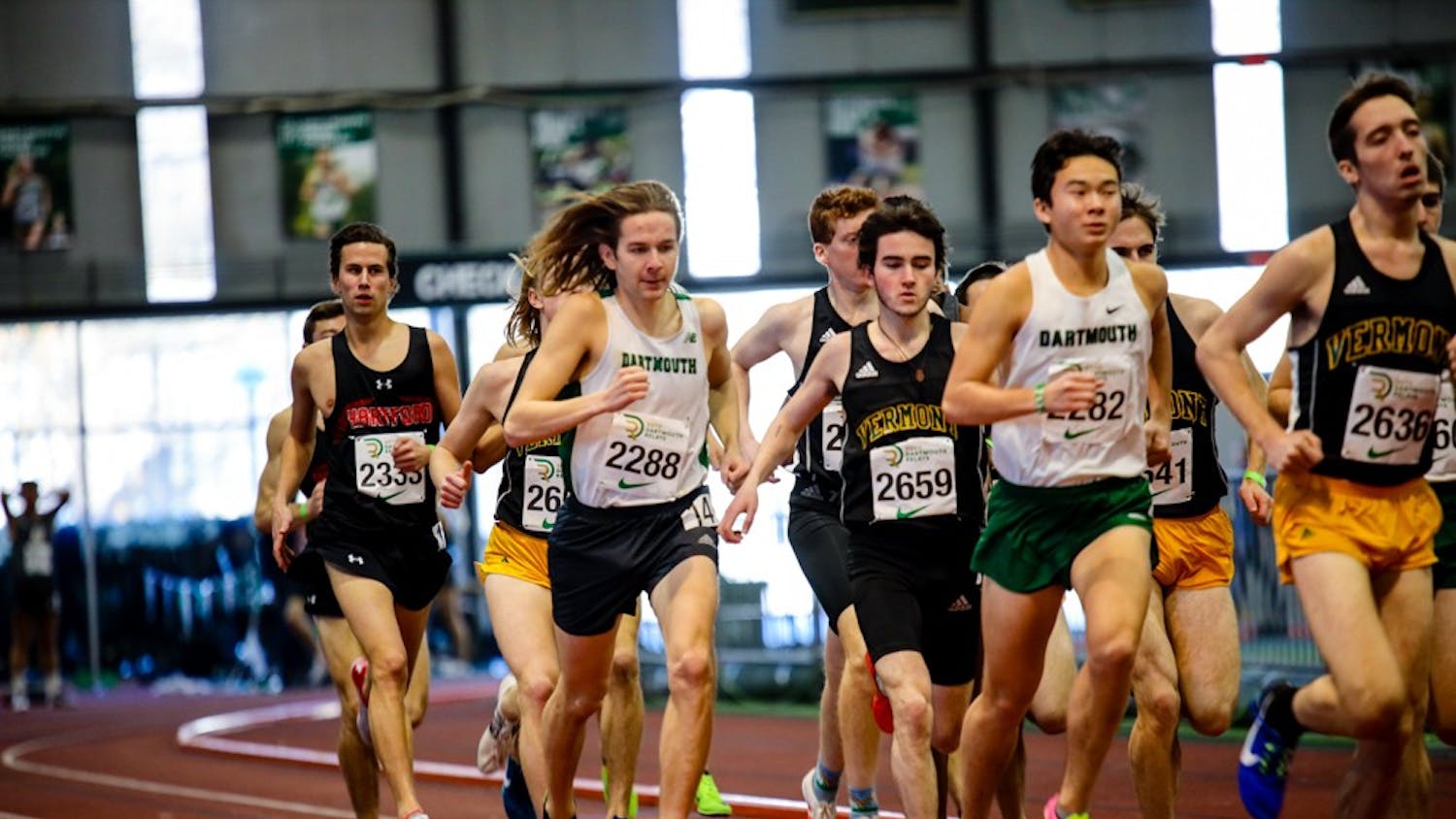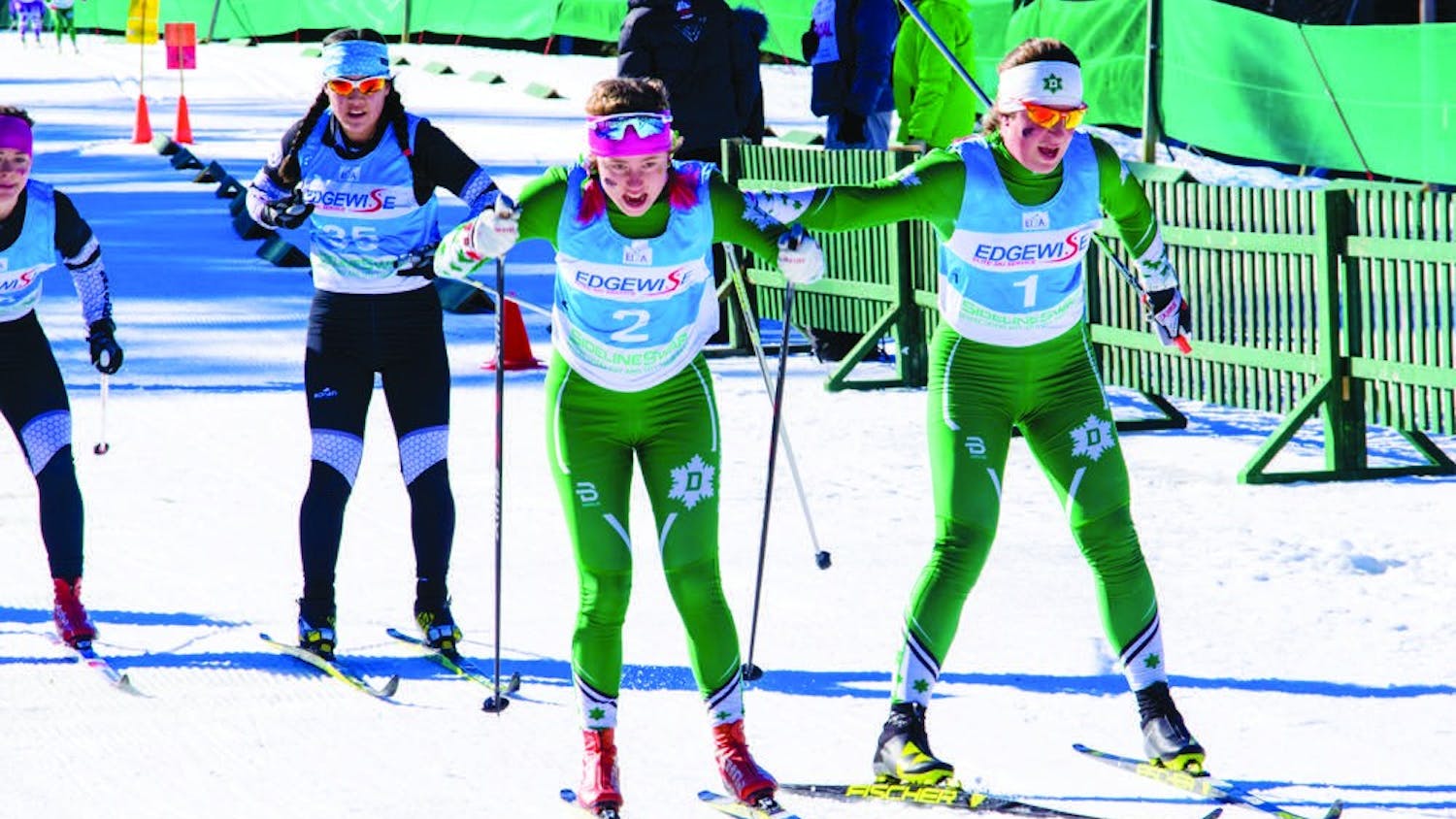“Last one, best one.”
I was given this hopeful command before my last track race for Dartmouth. I came into the race undertrained thanks to an injury I picked up running indoor track that kept me out for six weeks. I wasn’t in great shape and didn’t expect much. Still, there was some small hope that because it was my last race, maybe, just maybe, I could summon some indomitable spirit from deep within and run like a man possessed across the finish line of my final race. That didn’t happen. The race went exactly as the facts suggested it would: I was able to run as fast as the training I had done up to that point allowed. I did not run my fastest time or place my highest place. I finished. I did my cool down jog. I got dinner with my mom.
The next day, the second and final day of the competition, I was a spectator.
It rained all day — cold rain that gets into your bones and makes you want nothing more than to curl up with a book and read. In between marquis events, I went for my scheduled shake-out jog to clear my legs of the lactic acid from the night before. My shoes filled up with water within the first minute of my run and made it difficult to lift my knees. I came back soaked-through, shivering, and descended five flights of stairs to shower in the visiting locker room at Princeton University. As the not-quite-hot water washed over my shoulders, I thought, wistfully, “This is an ending.”
After the meet, we loaded up the bus and departed for Hanover. We left just past 5 p.m. and took slightly less than an eternity to come home. In the meantime, we ate boxed Panera sandwiches and missed the “Game of Thrones” premiere. As a new day began at midnight, chatter died down, seat-swapping became less frequent and we slipped slightly through the night into Vermont.
When we arrived back on campus, it was past 1 a.m. My legs ached as I got off the bus. I looked up. It was a partly cloudy night. A few stars glittered at the edges of dark clouds. I inhaled the familiar cool, crisp pine air — nothing like the air of New Jersey.
Every time I’ve returned to Dartmouth, I’ve had the uncanny sense of being far away. Far away from family, old friends; city-living, pollution; people of all ages; disease; visible poverty; real policing, politics, responsibilities; regular working hours and the quotidian tide of people flowing in and out at 9 a.m. and 5 p.m.
As a freshman, I was excited and then saddened by this sense of being far away. When I was a sophomore, I didn’t think much of it. As a junior, it unnerved and captivated me. Now, in my final weeks in Hanover, it interests and comforts me.
Dartmouth — secure in its standing and financial stability — will continue to exist in my absence. In fact, the institution will likely outlast me, all those who came before me and all who follow. Dartmouth is as much an idea as it is a physical location, institution and brand. As a soon-to-be-alumnus, this makes parting with Dartmouth in a few weeks a lot less scary. It will be here. We can come back.
Truth be told, I’ve thought about endings this senior spring a whole lot less than I thought I would. I’ve been busy — and as I write this article, my last one for The Dartmouth, I’m surprised that I have much less to say on the topic of endings than I thought. This, I believe, is one of the biggest lessons I’ve gotten from Dartmouth: My expectations have constantly been subverted. I’ve suffered disappointment during the times I pictured myself most happy. I’ve stumbled into moments of joy during snowstorms and sub-zero temperatures.
Now, approaching graduation, there are many things I can’t predict (including when construction will be finished in front of the Hop). (My guess would be before generous alumni return for Reunions.) Another is: What would a proper ending to college look like?
My best guess on that one came from a close friend whom I had told about the “Last one, best one” comment.
“That’s just it,” she said, shaking her head. “It’s not ‘Last one, best one.’ It’s just ‘Last one.’”
When I explained this interaction recently to another friend of mine who is graduating, she said, “Right. Everyone wants their ending to be a superlative, but it doesn’t have to be. It just is.”
I cogitated on this while she sipped her coffee. Then I wrote it down in a note on my phone called “Last Dartmouth Article.” The header read: “How do you write a senior piece that isn’t totally cliché?” I thought that this was something to work with, something to bring to Dirt Cowboy and sit with and really mull over the way I had done 33 times before over the past four years writing for this publication. So that was the start, that was this article, number 34, but how to end it? What was my big pronouncement? My grand take-away?
I thought about this for a while, and as I thought, my gaze drifted to the window. It was one of the first sunny days of the spring, and the Green, robust and grassy after such heavy and sustained rains, was blanketed with students stretched out under the sun. Some wore bathing suits, others wide-brimmed hats and sunglasses. It wasn’t anywhere close to hot, and yet, from where I was sitting, the collective excitement of pretending like it was — of being able to lounge outside with friends — was visible. Something about this struck me. It wasn’t Green Key or the run-up to Commencement. It was just a 60-degree day that felt like heaven after a winter of snow and a spring of rain; a regular beautiful far-away day in Hanover, New Hampshire. I smiled. “This is enough,” I thought.
“This is an ending.”
Szuhaj is a member of The Dartmouth staff.



